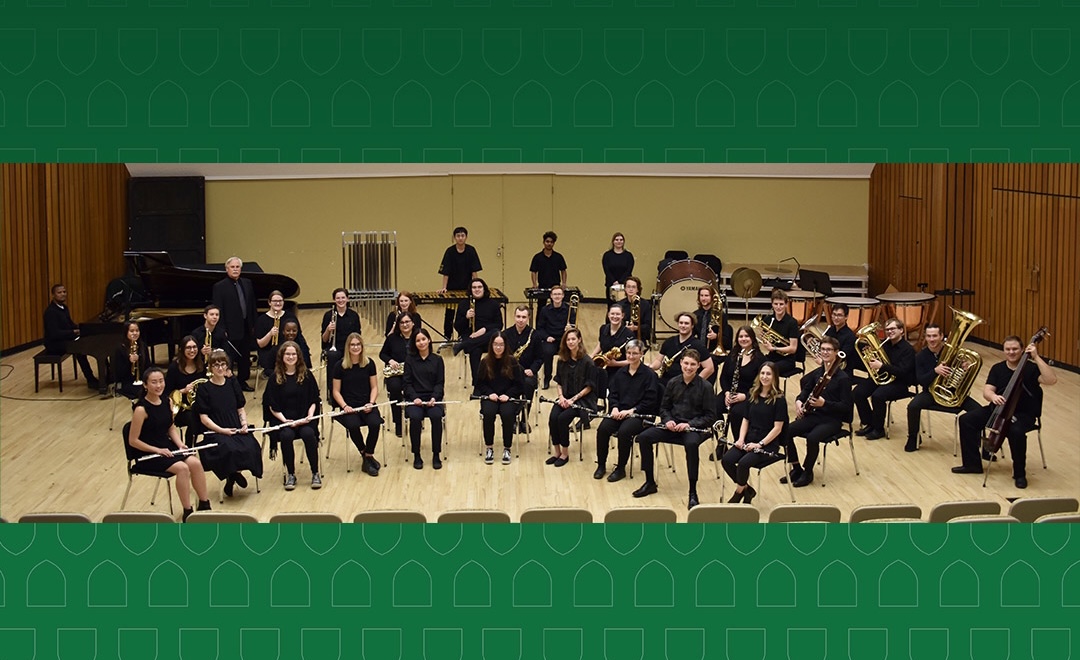
On March 30, the University of Saskatchewan Concert Band coordinated a concert to celebrate the department of music’s 90th anniversary, at the same time marking the band’s own 60th anniversary.
The U of S Concert Band, which is a non-audition band that allows players of all abilities and majors to create music at Quance Theatre every Tuesday evening, joined the uptick of ongoing tribute performances for Ukraine in the wake of the Russian invasion.
Glen Gillis, the conductor of the U of S Concert Band and a professor in the department of music, urged the audience to support Ukraine by playing a piece by a Ukrainian composer.
“Lux Aurumque,” written by Eric Whitare, means “light and gold” in Ukrainian, and holds an overarching Christmas theme.
Gillis’ said that he chose the piece because he had grown up in a town with a large Ukrainian population. Demonstrating his solidarity, Gillis said that he mourned the rich Ukrainian culture that might be destroyed by the war.
“I [remember] the memories of going to a wedding and all kinds of different events and tasting Ukrainian food, growing up with passionate and strong people,” Gillis said. “We’re dedicating this [piece] to the Ukrainian culture revival that is going on now,” Gillis said.
But the majority of the concert remained a cheerful, celebratory occasion.
The first piece, titled “Celebration 2022,” revealed the band’s culmination of hard work. The piece was written by Gillis himself, one of many pieces within his music composition portfolio.
Performing a piece by a USask professor contributed to the concert’s celebratory spirit, demonstrating a perfect way to unite the Saskatchewan forces of music through composition and execution of a piece.
The piece revealed the eloquence of Saskatchewan composers that have shaped the department of music over the past 90 years.
Continuing the trend of celebrating USask musicians, the following piece featured Ricardo Martin, a graduate student in the department of music. Showcasing the department’s talents, the saxophone soloist performed “Harlem Nocturne.”
In an interview with the Sheaf, Martin said that he had begun working with the orchestra as part of his role as a graduate student assistant in the department of music.
“I started playing, getting prepared for that solo at the beginning of this term. So every week I would come here and play with them,” Martin said.
Martin said he especially enjoys playing jazz music, which characterizes the style of “Harlem Nocturne.”
Jazz music differs from concert band music in that jazz includes improvisation that occurs through instrumental musical solos. While “Harlem Nocturne” was originally written for a jazz ensemble, Martin’s playing allowed for a concert-band adaptation of the piece.
Afterwards, another piece from Gillis’ musical composition portfolio was showcased. “Danza Energética” was a piece that was intended to evoke lively images of a flamenco tune — a Spanish form of music originating in Roma culture — to signal the celebratory occasion. The piece premiered at this concert.
The diversity of pieces played allowed a number of styles to be shown, highlighting the extensive portfolio of Saskatchewan-based musicians through community solidarity, similar to the political solidarity with Ukraine.
—
Annie Liu | Staff Writer
Photo: Supplied by Dr. Glen Gillis
Leave a Reply